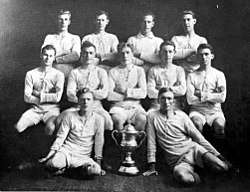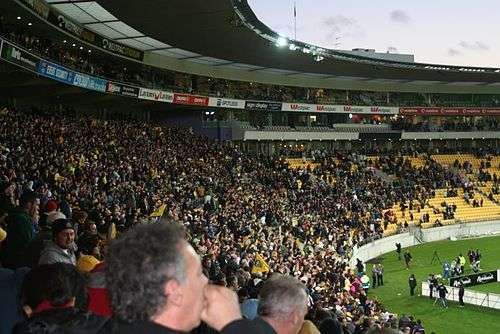Association football in New Zealand
| Association football in New Zealand | |
|---|---|
| Country | New Zealand |
| Governing body | Football |
| National team(s) | New Zealand |
National competitions | |
Club competitions | |
Audience records | |
| Single match |
37,034 – (2017) All Whites vs Peru (national team record)[1] 32,792 – (2010) Wellington Phoenix FC vs Newcastle Jets (club – competitive) 31,853 – (2007) Wellington Phoenix FC vs Los Angeles Galaxy (club – exhibition) |
| Season |
11,683 – (2007–08) Wellington Phoenix FC (average) 173,614 – (2009–10) Wellington Phoenix FC (cumulative) |
Association football, also known as football or soccer, is a popular recreation sport in New Zealand. The sport is administered in New Zealand by the governing body New Zealand Football (NZF). It is the third-most popular men’s team sport after rugby union and cricket.
Football is one of the most popular participation sport for young people in New Zealand. Among boys ages 5–17, it is the most participated in sport, with a 17 percent participation rate; among girls, it ranks fifth in popularity at six percent, behind swimming, netball, horse riding, and tennis.[2] Among New Zealand adults, it is the 12th most participated in sport, at seven percent.[2]
Administration
Seven regional federations participate in the administration and promotion of the sport in New Zealand:
- Federation One (Northern Football Federation) - Northland, Northern and Western Auckland
- Federation Two (Auckland Football Federation) - Central, Eastern and Western Auckland
- Federation Three (Waikato-Bay of Plenty Football) - Waikato, Bay of Plenty and King Country
- Federation Four (Central Football) - Gisborne, Hawke's Bay, Taranaki, Manawatu-Wanganui
- Federation Five (Capital Football) - Greater Wellington, including the Kapiti Coast and Wairarapa
- Federation Six (Mainland Football) - Tasman, Marlborough, Nelson, West Coast, Northern and Central Canterbury
- Federation Seven (Footballsouth) - South Canterbury, Otago, Southland
History and achievements

The first Chatham Cup final was played in October 1923, when Seacliff from Otago defeated Wellington YMCA 4-0. The Chatham Cup has become New Zealand football's longest-running club competition.[3]
New Zealand's senior men's side, the All Whites, has qualified twice for the FIFA World Cup. In 1982 the qualification was notable in that New Zealand played more matches (15) and traveled further (55,000 miles) than any other team to qualify.[4] Grouped with Brazil, Scotland and the USSR, New Zealand did not win any of their matches. They also qualified for the 2010 World Cup in South Africa.[5] New Zealand drew all their matches and did not progress beyond the initial round. They were the only team to remain undefeated in the competition.
New Zealand also participated in the 2009 Confederations Cup, also in South Africa. They were placed in Group A with Iraq, South Africa, and Spain. New Zealand lost their opening match 0–5 against Spain before losing 0–2 to South Africa. However the team earned New Zealand's first competition point at a senior men's FIFA tournament after drawing 0–0 with Iraq. In the 2010 World Cup, they again exited in the first round, but had far more success on the field than in 1982 or in the Confederations Cup. The All Whites drew 1–1 with Slovakia and defending champion Italy and 0–0 with Paraguay.
New Zealand hosted the 1999 FIFA U-17 World Championship, with matches played in North Shore City, Napier, Christchurch and Dunedin. New Zealand also hosted the inaugural FIFA U-17 Women's World Cup in 2008, with matches hosted in North Shore City, Hamilton, Wellington and Christchurch.
New Zealand's under-23 team, the "Oly-Whites", qualified for their first Olympic Games appearance in 2008 for the Beijing Summer Olympics. The Oly-Whites drew against China and lost against Belgium and Brazil.
The New Zealand's women's team also qualified for their first Olympic appearance, where they drew against Japan and lost to Norway and USA. In addition to this, the Football Ferns have participated in the 1991 and, more recently, the 2007 FIFA Women's World Cups. New Zealand won the 1975 AFC Women's Championship, defeating Thailand 3–1 in Hong Kong.
Professional football

Fully professional football began in 1999 with the induction of the Auckland-based Football Kingz FC into Australia's National Soccer League (NSL). Despite having a record of poor attendances, Auckland was included in the A-League competition when the NSL was scrapped in favour of an eight-franchise A-League. The Kingz were re-branded as New Zealand Knights FC but still only managed to draw small crowds. In their final season, the average attendance for the Knights was 3,014, well below the average of the next lowest attracting team—Perth Glory averaging 7,671.
During the later stages of the 2006–07 season, Football Federation Australia (FFA) removed the New Zealand Knights's (NZK) A-League licence due to the club's financial and administrative problems and poor on-field performance. After the resignation of the NZK board, the FFA transferred the licence to New Zealand Soccer for them to administrate the rest of the club's season before its subsequent dissolution.
After these events, the FFA granted a provisional competition licence for New Zealand Soccer to sub-let to a suitable, New Zealand-based team to take the place left vacant by the defunct Knights. After much delay from both the FFA and NZS, Wellington property magnate Terry Serepisos was selected as the owner of the new franchise. The team, eventually named Wellington Phoenix FC, would be based at Wellington's Westpac Stadium and coached by Ricki Herbert. Herbert also held the responsibility of coaching the New Zealand national team. With only three months to prepare, the Phoenix faced a first season without a proper pre-season and with a much smaller talent pool to recruit from.
The first game in Phoenix history, a 2–2 draw with then-reigning champion Melbourne Victory, set a new national record for attendance at a competitive football fixture at 14,421. The cumulative attendance over the first three home matches exceeded that of the Knights entire cumulative attendance from both years of their existence. The national attendance record was later exceeded a second time, with 18,345 turning out for a 1–2 loss against Adelaide United. The Phoenix followed this match with an exhibition friendly against Los Angeles Galaxy, including their marquee player David Beckham. The attendance from this match of 31,853 set a new national record for attendance at any football match which was only broken by the game the national team played with Bahrain to qualify for the 2010 World Cup.[6]
Wellington finished its first season last in the league on goal differential, having equal points with seventh-placed Perth Glory, and only earnt one more ladder point than the Knights had the previous season. Despite this, Phoenix was declared the success story of the 2007–08 season by the FFA.
On March 7, 2010 a new attendance record for a club football fixture was set in Wellington during play-off match against Newcastle Jets. Phoenix won 3–1 in the extra time in front of 32,792 fans.
National competitions
The current national senior men's competition is the ISPS Handa Premiership (previously known as the ASB Premiership and Stirling Sports Premiership), a professional/semi-professional franchise league founded in 2004. The Premiership runs in the summer, and currently consists of ten teams run by winter league clubs - Auckland City, Waitakere United, Eastern Suburbs, Hamilton Wanderers, Hawke's Bay United, Team Wellington, Tasman United, Canterbury United and Southern United, along with a Wellington Phoenix Reserves side. The Premiership provides New Zealand's two representatives to the OFC Champions League, namely the season champion and the winner off the playoffs. NZF also runs the National Youth League, with the academy sides affiliated with each Premiership franchise.
The National Women's League, unaffiliated with the Premiership, consists of seven Federation Representative teams playing each other once.
Before 2004, the national senior men's football competition was the National Soccer League. The NSL, founded in 1970, consisted of teams belonging to the regional leagues - for example, the inaugural NSL featured three teams from the Northern League, three from the Central League, and four from the now-defunct Southern League (now split into Mainland Premier League and Soccersouth Premier League). The NSL ceased to exist after the 2003 season.
The Chatham Cup is a national knockout competition in the style of England's FA Cup. It is the oldest competition, having been contested since 1923. It is open only to clubs from the regional winter competitions - NZFC sides are not eligible to compete, nor is Wellington Phoenix FC. The competition runs alongside the winter club seasons, beginning in April and usually concluding in September. The current holder is Auckland-based side Birkenhead United.[7]
The Women's Knockout Cup is New Zealand Footballs women's national club based knockout competition that was first played in 1994.[8]
Regional competition
Premier winter club competition is divided into four regional leagues:
- The Lotto Sport Italia NRFL Premier, consisting of teams from Federations One (North Harbour/West Auckland), Two (Auckland) and Three (Waikato/Bay of Plenty)
- The Central Premier League, consisting of teams from Federations Four (Central North Island) and Five (Greater Wellington)
- The Capital Football W-League, is a Women's Football league consisting of teams from Federations Four (Central North Island) and Five (Greater Wellington)
- The Robbie's Premier Football League, consisting of teams from Federation Six (Upper South Island)
- The ODT Footballsouth Premier League, consisting of teams from Federation Seven (Lower South Island)
National Champions
References
- ↑ https://www.stuff.co.nz/sport/football/nz-teams/98789999/all-whites-play-out-tense-scoreless-draw-with-peru-in-world-cup-playoff-first-leg
- 1 2 "Top sports and physical activities". Archived from the original on January 31, 2006.
- ↑ First Chatham Cup football final on NZ History
- ↑ "1982 World Cup Team". Archived from the original on June 5, 2009.
- ↑ "New Zealand qualify for 2010 World Cup finals". Reuters. 14 November 2009.
- ↑ "New Zealand qualify for World Cup with play-off win over Bahrain". The Guardian. London. 2009-11-14. Retrieved 2010-05-23.
- ↑ "ultimatenzsoccer". ultimatenzsoccer. Retrieved 11 September 2016.
- ↑ "History". Ultimatenzsoccer. Retrieved 25 October 2017.